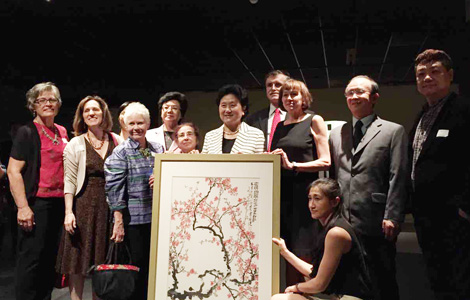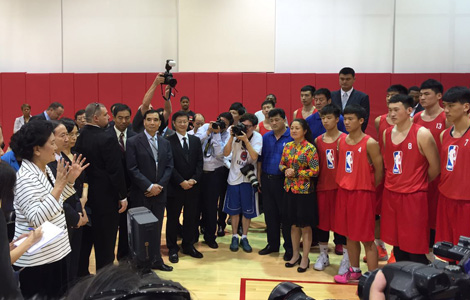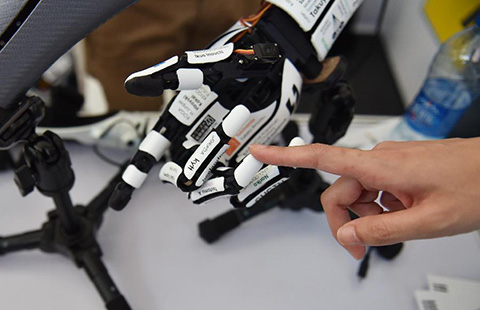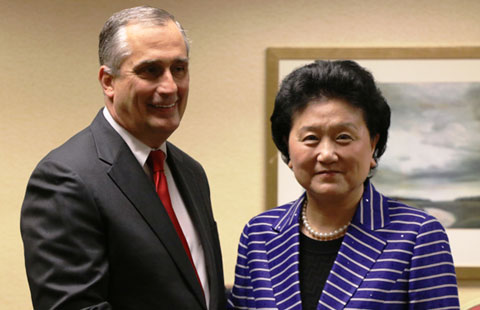Wang Yang hails S&ED
Updated: 2015-06-22 12:21
By Chen Weihua in Washington(China Daily USA)
|
||||||||
Chinese Vice-Premier Wang Yang believes the upcoming 7th China-US Strategic and Economic Dialogue (S&ED) will be of particular significance for laying the groundwork for President Xi Jinping's state visit to the US in September.
In an op-ed piece published on the Wall Street Journal website on Sunday afternoon, Wang said he and the Chinese delegation are looking forward to engaging in candid talks with US colleagues to achieve a broad consensus, better solutions and mutual success.
As special representatives of President Xi, Wang and State Councilor Yang Jiechi will join US Secretary of State John Kerry and Secretary of Treasury Jack Lew, special representatives of President Barack Obama, in co-chairing the S&ED in Washington on June 23-24.
Wang disagrees with the notion that the S&ED produces more accusations than results. "The facts clearly prove otherwise," he wrote. "The dialogue helped both countries identify and expand common interests and achieve mutually beneficial outcomes."
He cited the examples of talks on the Bilateral Investment Treaty (BIT) and climate change. S&ED was critical in kick-starting talks on BIT that had been stalled since 1982, but was jump-started in 2013 during the 5th round of S&ED. The two countries exchanged negative lists in Beijing just 10 days ago.

According to Wang, the historic joint statement on climate change announced by Xi and Obama in Beijing last November was the result of the previous three rounds of S&ED. "Such progress also gave a strong boost to multilateral negotiations," Wang said, clearly referring to the UN Climate Conference in Paris late this year.
"Maintaining a strategic dialogue has helped the US and China effectively manage differences and minimize their impact on our relationship," Wang said in the op-ed, titled US-China Dialogue Pays Dividends.
According to Wang, over the past decade China has been committed to market-based currency reform and the yuan has appreciated 35 percent against the US dollar, citing a recent IMF report which said China's currency is "no longer undervalued."
The vice-premier said trade is a two-way street. "Many Chinese companies have long been frustrated by the high barriers the US has imposed on investments from China, such as stringent security reviews. They've also found it difficult to obtain business visas. It is through dialogue that some of these concerns have been addressed by Washington. We look forward to more such positive steps," Wang said.
He described dialogue as a two-way process of learning and adapting, which enables the two sides to approach issues in a more collaborative and effective manner. "There are different ways of resolving differences and frictions, and dialogue is certainly the most cost-effective means for doing so," said Wang, who has come to the US twice in the last two years, including attending the 2013 S&ED and the China-US Joint Commission on Commerce and Trade in Chicago last December.
"The Strategic and Economic Dialogue is a sign of the growing maturity of China-US relations," he said.
The vice-premier believes the convergence of interests has gone beyond many people's imagination. It is now such that neither side can afford noncooperation or confrontation.
"China-US relations are facing a rare opportunity for development. Yet many challenges remain," he wrote.
"Let's work together to strengthen bilateral relations for the benefit of our peoples and the world."
chenweihua@chinadailyusa.com
- Thailand still faces risk of MERS: official
- 21 civilians injured as blast hits Afghan parliament
- Taliban attack on Afghan parliament widely condemned
- EU launches naval operation against human smugglers
- Russia, China do not form blocs against anyone: Putin
- No daily MERS cases, deaths added in S Korea

 Liu visits Houston Museum of Natural Science
Liu visits Houston Museum of Natural Science
 Liu meets Tsinghua Youth team in Houston
Liu meets Tsinghua Youth team in Houston
 Liu visits CI in Pittsburgh
Liu visits CI in Pittsburgh
 Shenzhen Maker Week kicks off
Shenzhen Maker Week kicks off
 Chinese wrap up Zongzi to mark upcoming Dragon Boat Festival
Chinese wrap up Zongzi to mark upcoming Dragon Boat Festival
 A Chinese Garden in a Sister City
A Chinese Garden in a Sister City
 Across America over the week (June 12-18)
Across America over the week (June 12-18)
 Liu meets Intel CEO
Liu meets Intel CEO
Most Viewed
Editor's Picks

|

|

|

|

|

|
Today's Top News
Liu Yandong plays basketball diplomacy
Wang Yang hails S&ED
Tsinghua students flying high
Chinese Premier emboldens state firms' int'l industrial cooperation
CI in Pittsburgh welcomes
vice-premier
Sichuan and Pittsburgh unveil
new school
Russia, China do not form blocs against anyone: Putin
More than 'greet'
and 'meet'
US Weekly

|

|





